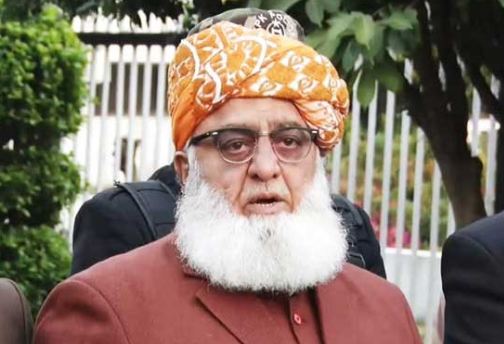ISLAMABAD, DEC 20 /DNA/ – JUI-F chief Maulana Fazlur Rehman has expressed optimism about the approval of the Societies Registration (Amendment) Bill 2024 that deals with the registration of seminaries as Prime Minister Shehbaz Sharif ordered the authorities concerned to resolve the matter swiftly.
“Hopefully, practical steps in accordance with the constitution will be taken as per our demands,” the religio-political leader said while speaking to journalists after meeting PM Shehbaz on Friday.
The meeting came a day after the premier contacted the JUI-F on the madrassa registration bill issue and invited him for a meeting. The meeting was attended by National Assembly Speaker Ayaz Sadiq, Deputy Prime Minister Ishaq Dar, Minister for Law and Justice Azam Nazeer Tarar, Information Minister Attaullah Tarar, PM’s aide Rana Sanaullah and Attorney General Mansoor Usman Awan.
Meanwhile, Abdul Ghafoor Haideri, Senator Kamran Murtaza, Raja Pervez Ashraf and Qamar Zaman Kaira were also present on the occasion.
The disputed madrassa bill, which has already been passed by both houses of parliament, has become a bone of contention between the Jamiat Ulema-e-Islam-F (JUI-F) and the government. Its enactment was part of an agreement between the government and the religio-political party for supporting the 26th Amendment, Fazl had said previously.
Following its approval from parliament, the bill now requires the president’s assent to become law but President Asif Ali Zardari had returned the bill earlier this month, citing legal objections. According to the Constitution, the bill must be tabled before a joint sitting after the president refuses to sign.
Article 75 (2) of the Constitution of Pakistan states: “When the President has returned a Bill to the Majlis-e Shoora (Parliament), it shall be reconsidered by the Majlis-e-Shoora (Parliament) in joint sitting and, if it is again passed, with or without amendment, by the Majlis-e-Shoora (Parliament), by the votes of the majority of the members of both Houses present and voting, it shall be deemed for the purposes of the Constitution to have been passed by both Houses and shall be presented to the President, and the President shall give his assent within ten days, failing which such assent shall be deemed to have been given.”
The new bill amends the existing procedure for registration of madrassas with the education ministry, stating that the institutions should be affiliated with the industries ministry instead.
During the meeting today, the prime minister directed the Ministry of Law and Justice to take steps in accordance with the Constitution and law to resolve the issue swiftly.
Speaking to journalists, Fazl said that he reiterated his stance on the madrassa registration bill issue. “We made it clear that, the bill was passed by the both Houses — the National Assembly and the Senate — and it has become an act.”
Play Video
He noted that the speaker has addressed the objection to the bill, forwarded by President Asif Ali Zardari. “However, the second objection sent by the President is not constitutionally valid,” he said, adding that the president did not respond to the speaker’s answer.
Fazl claimed that the second objection was sent after the constitutional period lapsed.
Giving details about the meeting, the politician said they received a “very positive response” on his stance. “[The] prime minister spoke with good intentions,” he said, hoping the matter would be resolved soon.
“Perhaps there is no need for a joint session of parliament on this issue,” the JUI-F chief said in response to a question.
‘Madrassa Act likely to lead to FATF, GSP+ curbs’
As per the sources, the president raised eight objections over the bill Societies Registration (Amendment) Bill 2024, under which madrassas would be registered.
President Zardari expressed fear that if the madrassa bill turns into a law, seminaries will be registered under the Societies Act, which may lead to imposition of Financial Action Task Force (FATF), Generalised Scheme of Preferences Plus (GSP+), and other sanctions on the country.
He highlighted a potential conflict of interest arising from the registration process and expressed concerns on potential negative consequences for Pakistan’s international standing and internal stability.
According to the objections, the registration of religious seminaries under the law would lead to spread of sectarianism and establishment of many seminaries in the same society would lead to deterioration of the law and order situation. The president objected that there was a contradiction in the definition of madrassa in various provisions of the new bill.
He objected that by registering madrassas as societies, they could be used for purposes other than education; there was a contradiction in the definition of madrassa in various clauses of the bill.
The registration of madrassas in the society would lead to a conflict of interest and such a conflict of interest would also lead to international criticism, while the approval of the bill could lead to a change in the FATF and other international organisations’ opinions and ratings of Pakistan, the objection by the president said.
The president suggested to the members of the assembly that international issues should be taken into account while drafting a bill related to madrassas.

















